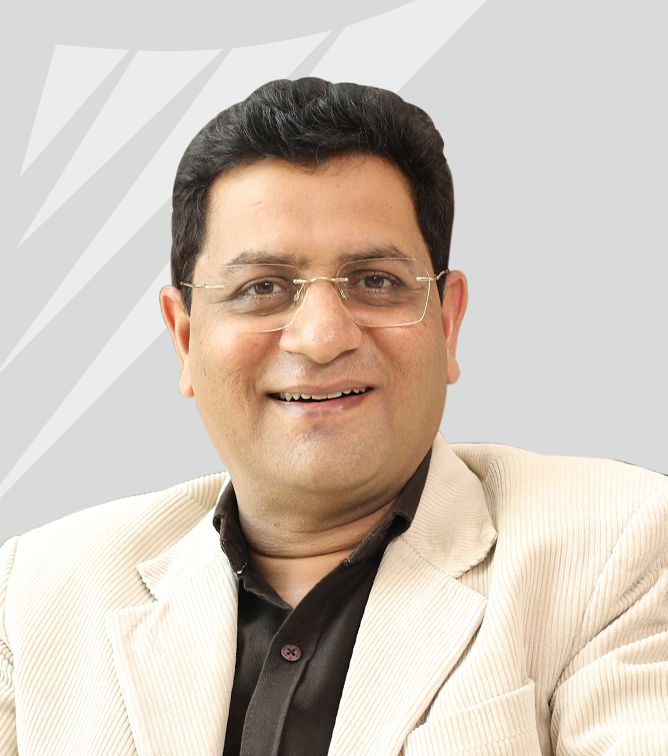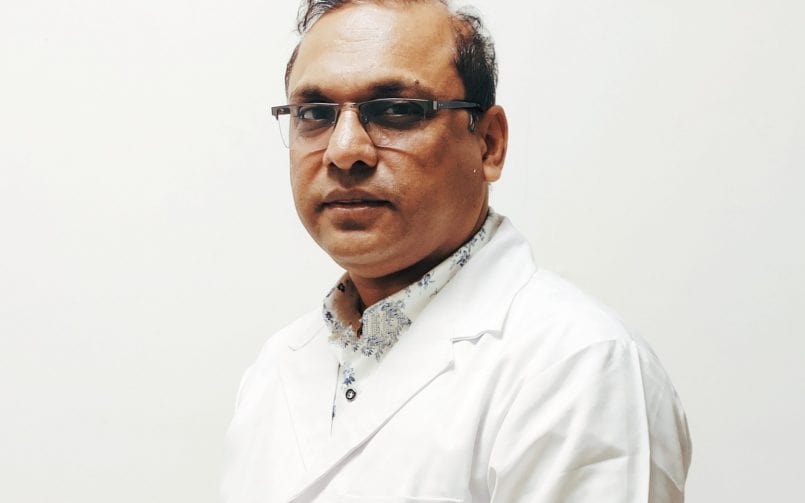Home » Medical Procedure » Bone Fracture Surgery
Best Hospital for Bone Fracture Treatment and Surgery in India
orthopedic surgeons utilize advanced techniques to ensure precise and effective treatment.
What is Bone
Fracture?
When an extensive force applied to a bone is more than the bone can withstand, a shattered bone or bone fracture happens. This affects the bone’s strength & structure, causing pain, functional loss, and occasionally bleeding and damage in the nearby tissues.
Traumas like falls, accidents, or sports injuries are often the reason for bone fractures. The chance of developing a particular type of fracture can, however, be increased by several medical conditions and repeated stress. Bone fractures are a highly frequent injury that can occur at any age. Ask your bone doctor to conduct a bone density test if you are older than 50 years or have a family history of Osteoporosis. Depending on the type of break, the patient’s age, health, and other factors, the healing time for broken bones ranges from 4-8 weeks. You could require bone fracture surgery to fix a broken bone. Some people’s bones can recover with just a splint, brace, cast, or sling.

Renowned Bone Fracture Surgeons
at Wockhardt Hospitals
- Mumbai Central
- Mira Road
- Nagpur
- Rajkot
Signs & Symptoms of a Fractured Bone
Depending on the specific bone and the extent of the damage, a fracture may cause the following symptoms:
- Pain
- Numbness and Tingling
- Swelling
- Bruising or discoloration of the skin.
- Tenderness
- A physical limitation that prevents you from moving a body component normally.
- A lump or deformity that is not usually present on your body.
What Causes
Bone Fractures?
Traumas are usually often the root cause of bone fractures. Anything may fracture a bone in your body if it strikes it hard enough. Among the most common causes are:
- Trauma
- Falling from a height
- Vehicle Accidents
- Direct Blow
In some cases, a bone may fracture on its own without any external force. Stress fractures can develop due to repetitive motions, such as jogging or sports participation. Similar to overuse syndrome in your hands and arms, overusing a single action or motion over an extended period can cause it. If you have osteoporosis, your chance of breaking a bone is substantially increased.
Bone Fractures Dos and Don’ts
You should be aware of the proper actions to take when encountering a bone fracture because they cannot always be avoided.
Do’s
- The best course of action after a bone fracture is to see an orthopedic immediately. You just need to wear a cast, brace, or splint to effectively immobilize the wounded area if you have a simple bone fracture. Your orthopedic physician will probably recommend bone fracture surgery for the complete healing of major bone fractures.
- Ensure that your cast remains dry. Fiberglass casts lose their efficacy when exposed to water, which also causes plastic casts to break down.
Don’ts
- If the bone protrudes, resist the urge to correct or force it in.
- To ensure that the damage heals properly, your doctor will advise you to wear the cast for a predetermined period. Consequently, regardless of how inconvenient you may feel, you're not supposed to take it off early.
Different Types of
Bone Fractures
There are several types of fractures, including:
- Closed (simple) fracture - Closed fractures are caused when a bone breaks but does not puncture the skin.
- Open (compound) fracture - A fractured bone protrudes through the skin, or a wound leads to the fracture site.
- Hairline fracture - This fracture frequently affects the foot or lower leg after being repeatedly stressed during activities like jogging or running.
- Compression fracture - When two bones are pressed up against one another, this type of fracture can happen. This kind of fracture can occur in the vertebrae and the spine's bones.
- Greenstick fracture - The bone has a small, narrow break in it. Children are susceptible to this because their bones are more malleable than those of an adult.
Complications of
Bone Fracture Treatment
Complications related to the bone fractures treatment are quite uncommon. Some of these complications might include:
- An anesthesia-related allergic response
- Prolonged immobility may elevate the risk of blood clot formation
- Minimal risk of injuring adjacent nerves or blood vessels
- Slight risk of infection
- During the healing process, the bones may shift, or a fracture may mend in the incorrect location.
First Aid
for Bone Fractures
Providing immediate first aid for bone fractures is crucial to alleviate pain and prevent further injury before administering professional bone fracture treatment. If you suspect someone may have a fractured bone, provide first aid and assist in getting them medical attention by following these steps:
- Use a sterile bandage, a clean towel, or a clean article of clothing to elevate and compress the wound if they are bleeding.
- If you suspect someone may have broken a bone in their back or neck, help them remain as still as possible.
- Apply an ice pack or ice cube bag wrapped in a piece of cloth to the affected region and leave it there for up to ten minutes at a time.
- Assist them in settling into a comfortable posture, encourage rest, and offer comfort. To keep them warm, cover them with clothes or a blanket.
- If possible, elevate the injured limb to minimize swelling.
- Administer over-the-counter pain relievers if necessary and if the person is not allergic.
- Dial emergency services to seek professional assistance
While these first aid measures can mitigate initial discomfort, professional bone fracture medical procedures are essential for a comprehensive diagnosis and treatment. Always consult a doctor for a thorough assessment and care.
What Tests are Done
to Diagnose Bone Fractures?
At least one of the following imaging procedures will be required to capture images of your fracture:
- X-Ray - Your bones' degree of damage and any fractures will be assessed via an X-ray.
- Magnetic Resonance Imaging (MRI) - An MRI may be performed by your doctor to obtain a full view of the damage to your bones and the surrounding tissue.
- CT Scan - Compared to an X-ray, a CT scan will provide your doctor or surgeon with a more thorough view of your bones and the surrounding tissue.
- Bone Scan - A bone scan is used by doctors to detect fractures that aren't visible on an X-ray. This scan takes longer, generally two visits four hours apart, but it can help locate certain fractures.
Bone Fractures Medical
Procedures and Treatments
Depending on the type of fracture, what caused it, and the degree of bone damage, a doctor will decide how to treat you, or a bone fracture operation should be done on you:
Immobilization
You could simply require a cast or splint if your fracture is minor and your bones did not shift much out of position. During three to five weeks, splinting is typical. If a cast is required, it will likely be required for a longer period of time, usually six to eight weeks. To ensure your bones are healing/mending properly in both situations, you’ll probably need further scans.
Close Reduction
For more serious breaks, a closed reduction is necessary to straighten your bones. Your healthcare professional will physically push and pull on the exterior of your body during this non-surgical technique to align the damaged bones inside of you. Your doctor will place you in a cast or splint following the closed reduction.
Bone Fracture Surgery
Bone fracture surgery is required for some bone fractures. There are a few methods your surgeon may use, depending on the type of fracture you have and the degree of bone damage.
- Internal fixation - Generally, they carry out a procedure known as internal fixation, in which the surgeon inserts metal into your bone to keep it in place while it heals. To allow your bones to mend and grow back together, the surgeon will realign them into the proper position and then secure them. To ensure that your bone can mend completely, you'll need to limit how much you utilize that area of your body. Some people live their entire lives with these parts implanted in them. You may require more procedures to eliminate them.
- External Fixation - You could require an external fixation in some cases. The surgeon will insert screws into your bone on each side of the fracture within your body, then link them to a brace or bracket wrapped around the bone outside your body. This is generally a temporary bone fracture repair to support your fracture and give it time to heal before you receive an internal fixation.
- Joint Replacement Surgery - If you fracture a joint, such as your shoulder, elbow, or knee, you may require joint replacement surgery. Your surgeon will replace the injured joint with an artificial joint. Metal, ceramic, or heavy-duty plastic can be used to make the prosthetic joint.
- Bone Grafting - If your fracture has a significant displacement or if your bone isn't reintegrating properly, bone grafting may be necessary. Your surgeon will reattach your shattered bone by inserting more bone tissue.
How Long Does It Take
Bone Fracture Surgery to Heal?
Age, diet, general health, and the kind of fracture determine how long it takes for a person to heal from a fracture. However, full recovery might take longer; the new bone begins to develop a few weeks after the injury. Usually, a fracture may be healed in 6 to 8 weeks. You ought to be able to begin moving again after a couple of weeks, depending on the kind of immobilization or bone fracture procedures you had to do for the bone fracture treatment. It may take a year or longer for more serious fractures to heal. Ask your doctor or surgeon for further information on what to anticipate throughout your recovery.
Risk Factors for
Bone Fracture Surgery
Although there are risks associated with all surgeries, knowing about them can help you and your physician make a more informed choice.
- Internal Damage - Fractures can harm the muscles, blood vessels, nerves, tendons, and ligaments in the vicinity of the injury.
- Malunion - This happens when your damaged bones do not align properly while they mend.
- Nonunion - Your bones may not heal completely or at all.
- Bone Infection - If you have an open fracture, you are more likely to have a bacterial infection.
- Acute Compartment Syndrome (ACS) - A buildup of pressure in your muscles may prevent blood from reaching tissue, resulting in lasting muscle and nerve damage.
Life Wins Stories
The vision and leadership of Wockhardt’s Founders have been instrumental in shaping the organisation’s ethos of providing high-quality and affordable healthcare services to patients worldwide. Read and listen to the heartfelt experiences of our patients as they share their stories about the exceptional care they received at Wockhardt Hospitals.



Paresh Vyas
Excellent facility with renowned Cardiologists like Dr Dharmesh R Solanki. Very humble doctors, and good staff. Value for money.

Meena Kothari
Excellent facility with renowned Cardiologists like Dr Dharmesh R Solanki. Very humble doctors, and good staff. Value for money.
Life Wins Stories

Paresh Vyas
Excellent facility with renowned Cardiologists like Dr Dharmesh R Solanki. Very humble doctors, and good staff. Value for money.

Meena Kothari
Excellent facility with renowned Cardiologists like Dr Dharmesh R Solanki. Very humble doctors, and good staff. Value for money.
FAQs on Bone Fracture Treatment
Q. Do all fractures require surgery?
No, not all fractures require surgery. The treatment approach depends on the type and severity of the fracture. Many fractures can be effectively managed with non-surgical methods, such as casting, bracing, or immobilization, while some complex fractures may necessitate surgical intervention for optimal healing.
Q. What is the recovery process like after a bone fracture treatment?
The healing process that takes place after bone fracture treatment involves immobilization or surgery followed by physiotherapy exercises to regain mobility and strength. Depending on the fracture type, some require a week of rest, while others take years before complete recovery and rehabilitation.
Q. How often should I follow up with my doctor during the healing process after the bone fracture medical procedure?
Follow your doctor’s guidance for follow-up appointments after a bone fracture medical procedure, typically scheduled at intervals ranging from a few weeks to a month.
Q. How many days will it take to walk after bone surgery?
You should be able to walk for at least 10 minutes at a time without the need for a walker, cane, crutches, or other assistive devices four to six weeks after your operation.
Q. How common are bone fractures?
Q. What can I expect if I have a bone fracture?
Q. Can I walk after a bone fracture treatment?
Q. Which hospital is best for bone fractures in India?
Q. How long does a bone fracture surgery take?
The duration of bone fracture surgery is influenced by several factors, such as the type and severity of the fracture, the surgical technique employed, and the patient’s individual characteristics. Typically, these procedures can last anywhere from one to several hours. In the case of complex fractures or those requiring additional procedures, the surgical time may be extended.
Q. Is bone fracture surgery painful?
Bone fracture surgery requires anaesthesia to guarantee that the patient does not feel pain during the procedure. However, there will be a degree of postoperative discomfort, which may vary with the nature of the fracture and the way the patient experiences it. Our comprehensive postoperative care and rehabilitation program, tailored to each patient’s needs, ensures a smooth recovery and complete pain relief.






























